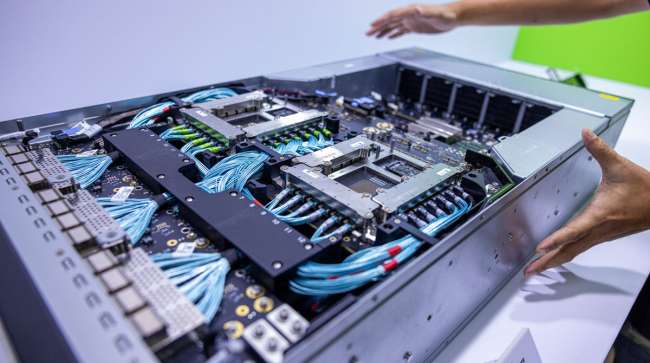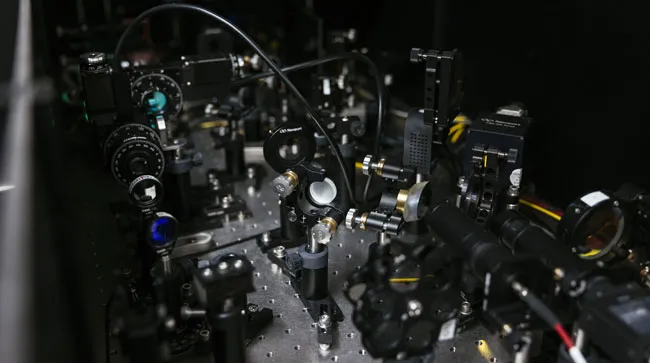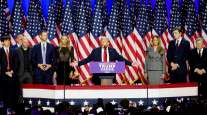Bloomberg News
US Pushes New Tech Export Rules to Limit China’s Access

[Stay on top of transportation news: Get TTNews in your inbox.]
The Biden administration plans to impose export controls on critical technologies including quantum computing and semiconductor goods, seeking to align key allies in a U.S.-led push to thwart advancements in China and other adversarial nations.
The envisioned rules target quantum computers and components, advanced chipmaking tools, a cutting-edge semiconductor technology called gate all-around, and various components and software related to metals and metal alloys. They cover all worldwide exports, but include licensing exemptions for countries that implement similar measures. That group includes Japan and the Netherlands, among other allies, and the U.S. anticipates that more nations will follow, the Commerce Department said in a press release.
The promise of more lenient license approvals offers an incentive for countries to join the U.S. camp, given American leadership in a range of academic fields and research partnerships. Washington has been cracking down for years on China and other adversaries’ ability to access cutting-edge technologies needed for artificial intelligence, over fears that advanced chips and components could lend Beijing a military edge.
On Sept. 6, ASML Holding NV — which makes chip gear crucial to the production of most advanced semiconductors — said it can now go to the Dutch government for approval to ship certain types of machines, rather than the U.S. And Taiwan’s economic minister said the island will take its cues from Washington.
“We respect global norms,” Minister of Economic Affairs Kuo Jyh-huei told reporters. “Taiwan cannot be independent from the norms of friendly countries in the world. I think we should follow suit.”

A microscope enclosed in a black box at the quantum computing lab inside the University of Chicago’s Eckhardt Research Center in Chicago. (Taylor Glascock/Bloomberg News)
The U.S. effort has included unilateral measures that Washington has tried to coordinate with a handful of key allies — such as sweeping semiconductor export controls first imposed in 2022 — as well as restrictions negotiated through a broader international framework, like those issued Sept. 5.
“Aligning our controls on quantum and other advanced technologies makes it significantly more difficult for our adversaries to develop and deploy these technologies in ways that threaten our collective security,” Alan Estevez, who runs the Commerce Department’s Bureau of Industry and Security, said in a statement.
RELATED: US Weighs More Tariffs on Chinese Goods, Including EVs
The U.S. and China are leading a global push by governments to explore quantum computing, which some argue will revolutionize technology. While local experts have expressed concern about the impact of Washington sanctions on Beijing’s efforts in quantum technology, it’s still too early to tell whether they’re significantly disrupting research in China.
Years away from delivering world-changing performance, quantum computers promise speeds millions of times faster than classical computers. Countries around the world are investing billions of dollars in quantum computers partly out of fear about the military and economic advantages they may yield.
Transtex CEO Mathieu Boivin discusses the environmental sustainability of auxiliary power units. Tune in above or by going to RoadSigns.ttnews.com.
The Sept. 5 action opens a 60-day public comment period before officials issue a final rule.
The U.S. has separately been working on a new package of chip-related export controls that would target China’s access to so-called high-bandwidth memory chips, an essential AI component, as well as a range of semiconductor manufacturing tools, Bloomberg has reported. That effort includes measures with a global focus — but with exemptions for key allies including Japan and the Netherlands, home to two of the most important companies in the chip supply chain.
Washington is pressuring Tokyo and the Hague to adopt similar rules, but has faced pushback from both governments, who are reluctant to harm their champion companies — and in Japan’s case, fearful of retaliation from China.
RELATED: China Responds to Canada’s EV Tariffs With Rapeseed Probe
Both Japan and the Netherlands have already imposed some restrictions aligning with the original U.S. rules in 2022, but with key differences that have frustrated American companies. Washington is working to close those gaps — with some recent progress in the Netherlands — and pursue a multilateral strategy on the latest potential measures.
“China is opposed to the U.S. turning trade and tech issues into political issues and weapons” Chinese Foreign Ministry spokeswoman Mao Ning told reporters in Beijing. “Obstructing normal cooperation on tech and trade and economic exchange violates the principle of market economy, destabilizes global industry and supply chains and serves no one’s interest.”
Want more news? Listen to today's daily briefing below or go here for more info:





